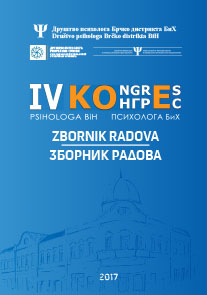Osjećaj nastavničke samoefikasnosti i autokratski stil rukovođenja razredom
Teacher’s sense of self-efficacy and autocratic style of classroom menagement
Author(s): Edna Dragunić, Sibela Zvizdić MecoSubject(s): School education, Educational Psychology, Personality Psychology
Published by: Logotip
Keywords: Autocratic style of classroom menagement; teachers’ sense of self-efficacy; five-factor model of diversity; teachers length of service;
Summary/Abstract: This study was concipated to investigate the realationship between teachers’ sense of self-efficacy in engaging studenst, teaching and managing the classroom on one hand and teachers’ tendency on autocratic style of classroom menagement on other hand. Also, the goal of this study was to determine whether there are differences in an autocratic style of classroom menagement with teachers lenght of service. Finally, we studied the relathionship between basic personality traits and teachers tendency to autocratic style of classroom menagement. One hundred and sewenty six (176) teacher subjects comparised in this study (M 22,2%, F 77,3%), from six elementary schools from Visoko, Zenica-Doboj Canton. The arithmetic mean age was 39. Four instruments were used: Sociodemographic characteristic questionnaire, Scale of teachers’ self-efficacy beliefs (Tschannen-Morgan and Woolfolk, 2001), Self-reating Scale of PFM based on lexical approach (Kardum Smojver, 1993), Teacher-Student subscale ratio/ autocratic style of classroom menagement (Šimić-Šašić, 2008).Results of complete regression analyzes showed that teachers’ sense of self-efficacy does not explain a statistically significant tendency of teachers to the autocratic style of classroom menagement. Also, regression analysis showed that comfort significantly in the negative direction explains the tendency towards autocratic style of classroom menagement. The results show that conscientiousness and openness significantly in the positive direction explain criteria of autocratic style of classroom menagement. Also, extraversion and neuroticism were not statistically significant predictors. Finally, the Kruskal-Wallis this test determined that there was no statistically significant difference between teachers in the tendency towards autocratic style of classroom menagement with regard to length of service.
Journal: Zbornik radova Kongresa psihologa Bosne i Hercegovine
- Issue Year: 2017
- Issue No: 4
- Page Range: 24-41
- Page Count: 18
- Language: Bosnian

